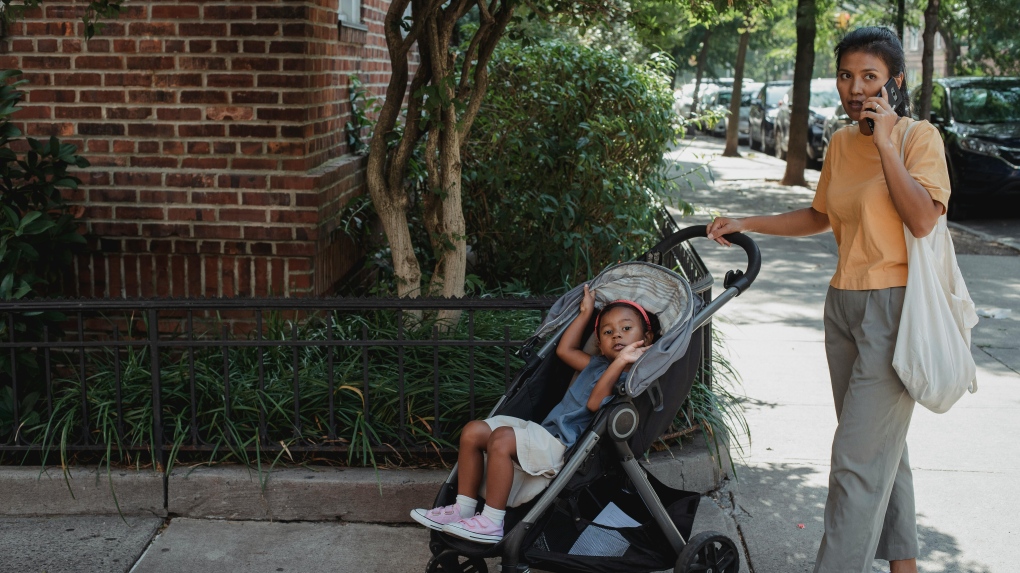Achi news desk-
The research on screen time for kids is pretty conclusive: less is more.
However, according to some experts, there is one type of screen time that is constantly excessive, and it is having a serious effect on our children: parental screen time.
Experts say that when it comes to child development, parents should spend less time worrying about their children’s screen time — and focus more on reducing their own screen time.
“When you have a parent who is detached and doesn’t give children that attention, it has a very negative effect on their development,” explains Dr. Victoria Talwar, Canada Research Chair in the Department of Educational and Counseling Psychology at McGill University. “They need to be able to explore their world and learn about it and engage with their environment in a practical way.”
According to her, parents have a strong hand in developing the early language, cognitive and emotional self-regulation abilities of their children.
“If we’re distracted and not paying attention to them, they don’t get that conversational input with us, which is really important for their development of understanding the world,” states Talwar.
Dr. William Bukowski, a professor of psychology at Concordia University, recognizes that parenting is a tightrope-like balancing act.
“You don’t want to be too intrusive. You don’t want to be intrusive,” he notes. “No one wants to be a parent of the helicopters, at least I don’t think anyone wants to be.”
At the same time, he notes that parents are a primary source of guidance and support, whether it’s helping a child prepare for a test or teaching them to identify and manage their emotions.
“The idea that screen time can disrupt this is that the more time you spend doing one thing, the less time you spend doing something else,” he explains. “Sometimes when you’re dealing with screen time, you end up closing the screen, but still thinking about whatever it is you happened to see.”
A father on his phone while his children eat breakfast. (Pavel Daniliuk/pexels.com)
half-hearted attention
The biggest issue surrounding parental screen time?
Attentive parents who constantly give half-hearted attention to their kids while scrolling through TikTok or Instagram doom.
“Are you present in the relationship or are you not present in the relationship?” Bukowski asks. “Sometimes, your presence is needed more than at other times, and if at that moment, you’re distracted by something, then it’s a lost opportunity. It also might let someone know how important I am to that person. Am I less important than the screen?”
He points out that the main role of a parent is to be in the zone of proximal development of his child, a concept in educational psychology that represents the space between what a person is able to do alone and what he has difficulty doing even with support.
“I think many moments in parenting are those golden moments where you suddenly see a need to be in your child’s zone of proximal development, where they suddenly need 30 seconds of scaffolding to help them get through something,” Bukowski tells CTV News. “The more you are distracted by some other things, and that’s how they are sometimes, the less time you have to be attentive to that moment when you need to.”
Talwar adds that researchers have found that parents can spend up to 30 percent of their time looking at their phones while on the playground with their children.
“During that time, kids are much more likely to do things like fall off the slides or fall off the swings,” she said. “It also means that we don’t notice or engage with our children, and a key way in which children learn is by engaging with their environment, including us, and that’s important to them.”
 A mother on her phone while walking with her child. (Kamaji Ogino/pexels.com)
A mother on her phone while walking with her child. (Kamaji Ogino/pexels.com)
Practice what you preach
Talwar points out that children are imbued and will usually follow in their parents’ footsteps.
“I have seen parents who complain, for example, about their older children’s use of their smartphones,” she recalls. “But those parents, while they were talking to me, could interrupt our conversation to look at their phone.”
Simply put, if we want our kids to put down their screens, we need to practice what we preach.
“We need to think about what we’re telling our children and what we’re actually modeling: Are we also doing the thing we don’t like them doing when we talk to them?” Talwar asks. “We also need to be more aware of what we’re doing.”
The professors stress that this doesn’t mean parents should feel guilty about having their phones on or looking at them every now and then, but, as with most things, moderation is key.
“We have to sometimes put the phone down and say, ‘This is the time I spend with my child,'” Talwar said. “There are many studies that say that one of the most significant things you can do is to make mealtime a time when the family engages with each other. It’s really great for children and really has a stabilizing effect.”
The key, concludes Talwar, is quality over quantity.
“It’s really important that they have a quality interaction where they feel like they have your attention,” she said. “Kids are designed to interact with us, and if you don’t take care of them, they will continue with you, try to get your attention…and one way for them to stop doing that is to actually give them some good quality attention.”

